Mushroom Supplements, the Big Trend in 2020
Functional Mushrooms and Their Rise to the Mainstream
The popularity of what’s come to be known as medicinal, or ‘functional mushrooms’, has exploded in Ireland and Europe over recent times, but this is no fad, as proponents like Paul Stamets and a small (but growing!) band of informed consumers, are beginning to show the world.
For thousands of years, mushrooms and fungi of many varieties have been used to treat ailments and illnesses, as well as maintain balance and health, by many cultures around the world, most notably in Chinese Medicine. Today however, they’re proving to be one of the hottest trends in 2020 in the world of ‘Super Foods’ and Wellness. This recent explosion in popularity can be attributed both to an increase in demand for natural remedies and solutions to health issues, as well as a jump in those looking to gain an edge… yes, gain an edge! Read on…
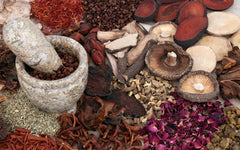
If you’re reading this, then chances are a mushroom based supplement of some kind has crossed your path in the not too distant past. However, that the form which this product took could include anything from powdered mushrooms, to capsules, mushroom coffee, teas, elixirs and extracts, all the way to brain boosting liquid shots and face masks, just shows how diverse this burgeoning industry is becoming. It would seem nearly every facet of human health is covered in the world of fungi, and with every passing day, that notion is becoming more and more bolstered by research. Didn’t Fungi give us penicillin, after all? And all of this is being driven by a market that’s projected to be $7.4 billion dollars in the US alone by 2022. This means that varieties such as Lion’s Mane, Cordyceps, Reishi, Chaga and Turkey Tail are now on the receiving end of a lot more study and are showing great potential for preventing disease and maintaining overall health and holistic balance.
And it’s not just these somewhat obscure, hard to find mushrooms that are showing promise. Every-day, mainstream kinds that you’d find in your stir-fry are too. Shiitake for instance, has been used in traditional Chinese medicine for centuries and will help regulate blood pressure, circulation and heart health. It’s a true superfood, containing vitamin D, and many minerals to boot. They’re also excellent sources of B-vitamins and selenium – an antioxidant essential in keeping your immune system strong and healthy. But it’s not just immune boosting properties that are catching consumer attention these days, there’s a legitimate edge to be gained too, both physically and mentally.
Cordyceps Sinensis and Endurance
 Our favourite mushroom for boosting athletic performance and endurance, is Cordyceps Sinensis. This interesting little fellow traditionally grows at altitude, high in the Himalayas, but having since found the limelight after the extraordinary exploits of Ma Junren’s Chinese Women’s Olympic running team in 1993, they have rose to prominence in mainstream circles, and are now being produced en masse in laboratories. The story goes that shepherds would observe their herd becoming lethargic due to the low oxygen levels at at high altitude in the mountains, and upon feeding upon these fungi, would soon return to a state of vitality. This observation then found its way through the path of Traditional Chinese Medicine and in to today’s cutting edge performance nutrition. Cordyceps Sinensis works by improving oxygen utilisation (up to 50%!), therefore providing extra aerobic capacity by increasing the bodies’ capacity for producing the molecule ATP (adenosine triphosphate), which is the clean burning source of energy that your body runs on. Along with athletic performance, Cordyceps has also been linked to libido and better sleep.
Our favourite mushroom for boosting athletic performance and endurance, is Cordyceps Sinensis. This interesting little fellow traditionally grows at altitude, high in the Himalayas, but having since found the limelight after the extraordinary exploits of Ma Junren’s Chinese Women’s Olympic running team in 1993, they have rose to prominence in mainstream circles, and are now being produced en masse in laboratories. The story goes that shepherds would observe their herd becoming lethargic due to the low oxygen levels at at high altitude in the mountains, and upon feeding upon these fungi, would soon return to a state of vitality. This observation then found its way through the path of Traditional Chinese Medicine and in to today’s cutting edge performance nutrition. Cordyceps Sinensis works by improving oxygen utilisation (up to 50%!), therefore providing extra aerobic capacity by increasing the bodies’ capacity for producing the molecule ATP (adenosine triphosphate), which is the clean burning source of energy that your body runs on. Along with athletic performance, Cordyceps has also been linked to libido and better sleep.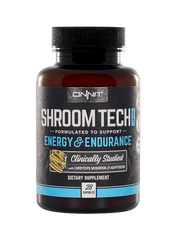
Gaining a mental edge with Lion’s Mane
Nootropics, sometimes known as ‘smart drugs’, are more accurately described as a group of supplements known to enhance cognition, creativity, memory and motivation and they’re all the rage these days in circles as diverse as tech, academia and even athletics. However, it’s the world of mushrooms where we can find the original nootropic supplement. Long been known to improve cognition and concentration, this feathery looking fungi is nature’s greatest nootropic as it also promotes the production of nerve protecting Myelin as well as NGF (Nerve Growth Factor), which are both crucial for maintaining a healthy brain, as imbalances in these can contribute directly to neurological diseases such as as MS, Vascular Dementia and Alzheimer’s Disease. In Short, if you want to protect your brain’s long-term health, as well as dispel brain fog, gain clarity and increase your cognitive abilities such as memory and concentration, then Lion’s Mane is probably the best place to start.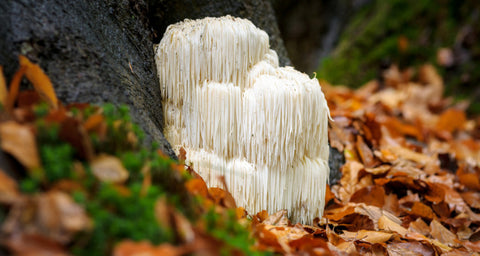
Reishi, otherwise known as Lingzhi – The ‘Mushroom of Immortality’
The most prolific variety shown to bolster overall health, increase blood flow, fight damage from free radicals, reduce inflammation and stimulate immune system functioning has to be Reishi and along with Turkey Tail and Chaga, has even shown efficacy in fighting cancer. Used in traditional Chinese medicine for over 2,000 years, Reishi has long been known as the “mushroom of immortality”. In fact, it is so revered that it would sometimes be depicted in ancient Chinese art as a ‘bridge connecting heaven to earth’, thus signifying spirituality and longevity.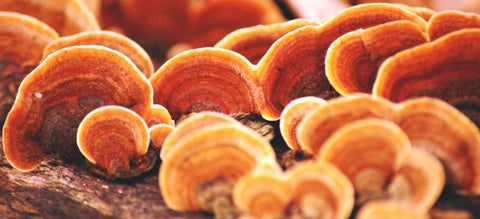
Further to this, as an Adaptogen, Reishi can be used ad as a powerful regulator of the body’s stress response as it is now being shown to alter hormone production and physiological responses to stress for the better. This means that in between the ever-fluctuating states of the fight-or-flight response, Reishi can help your body restore itself by aiding your body to go . It does this by acting positively on the sympathoadrenal system which regulates the body’s stress response. Its anti-inflammatory properties have also long been well known in the Chinese tradition and is known as being a valuable ally in lowering pain levels and combating diseases.
Lowering Inflammation and boosting your immune system with Chaga
If it’s anti-oxidants with a side of beta-glucans you’re after, then the Chaga Mushroom will be your go-to mushroom. There is no better fungi for fighting inflammation, free radicals and oxidative stress – one of the major factors in skin ageing. There is also evidence to show that this dark, blackish mushroom will lower LDL (low-density lipoprotein, also known as ‘bad’ cholesterol) and can slow down and even prevent the growth of cancer. Chaga has also been used in the Far East for centuries to increase energy and enhance mood and is often brewed in a tea to support immune system functioning.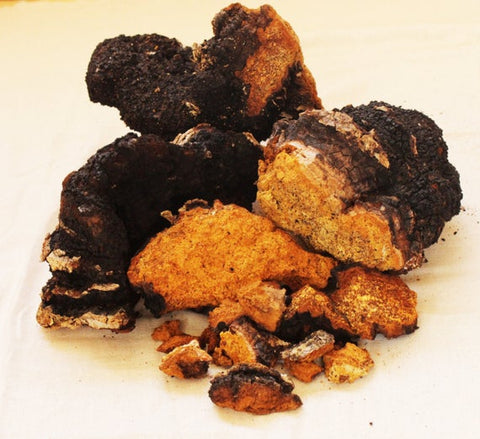
Not only can mushrooms be functional, medicinal and healing, but what’s more is they’re a genuine, nourishing superfood too. Low in calories, high in protein, and a great source of B and D vitamins, minerals and fiber, there are over 2,000 edible species out of the 1.5 m varieties of mushrooms and fungi. But the real revelations of mushrooms may be still yet to go mainstream, as the realms of medicine, psychiatry and psychotherapy embrace the potential applications for mushrooms in treating issues such as depression, end-of-life anxieties and addictions. Long known about and practiced in spiritual and shamanistic circles, modern day ‘medicine men’ such as the people at M.A.P.S. (Multidisciplinary Association for Psychedelic Studies and the Heffter Institute are now looking to promote wider research in to potential uses of mushrooms for alleviating psychological pain and trauma. With all these profoundly valuable and documented uses, it can easily give one pause for thought towards just how close our evolutionary relationship with the world of fungi truly is.
- Chaga
- Cordyceps
- Functional Mushrooms
- Lion's Mane
- Maitake
- Medicinal Mushrooms
- Mushrooms
- Reishi
- Shiitake


